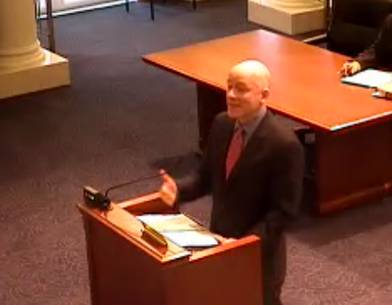
Iowa Supreme Court Hears Oral Argument In Lambda Legal Case Challenging HIV-Based Conviction
Blog Search
Today the Iowa Supreme Court heard arguments in Lambda Legal’s case representing Nick Rhoades, an HIV-positive Iowan in his appeal for post-conviction relief. Rhoades was initially sentenced to 25 years in prison withregistration as a sex offender after having a one-time sexual encounter with another manduring which they used a condom. His partner did not contract HIV.
Christopher Clark, Counsel for Lambda Legal, said:
Iowa’s law concerning the criminal transmission of HIV requires the State to show that a defendant engaged in conduct that could result in the transmission of HIV. At the time of the alleged crime, Mr. Rhoades had an undetectable viral load and he used a condom – he was clearly protecting his partner from exposure to the virus.And the growing medical consensus is that there is no real possibility of transmission under these circumstances.
In June 2008, Rhoades had a one-time sexual encounter with Adam Plendl during which they used a condom. Several days later, Plendl was told by a friend that Rhoades might be HIV-positive, and he contacted the police. The police arrested Rhoades in September 2008, and on the advice of his counsel, he pled guilty. Despite the fact that a condom was used and Mr. Plendl did not contract HIV, Rhoades was convicted under Iowa’s HIV criminalization law. He received the maximum sentence: 25 years in prison and classification as the most serious type of sex offender. Subsequently, the court suspended his prison sentence, and he was placed on supervised probation for five years.On March 15, 2010, Rhoades filed an Application for Post-Conviction Relief, arguing that the attorney who advised him to plead guilty had failed to inform him of the specifics of the statute, resulting in his conviction for a crime he did not in fact commit.In December 2011, the district court denied the application. Lambda Legal is representing Mr. Rhoades in his appeal, and gave oral arguments on Mr. Rhoades’ behalf in September 2013. On October 3rd, the Iowa Court of Appeals affirmed Rhoades’s conviction. Lambda Legal appealed that decision and the Iowa Supreme Court granted review of the case in January 2014.
Thirty-nine states have HIV-specific criminal statutes. Among other things, HIV criminalization perpetuates the many myths and misconceptions that fuel other types of discrimination against people living with HIV. It sends an inaccurate message regarding prevention responsibility, creates a disincentive to getting tested, and may actually discourage disclosure of HIV status.
Scott Schoettes, HIV Project Director for Lambda Legal, said:
Iowa’s law that criminalizes people living with HIV is a particularly unjust and extreme. It subjects them to unwarranted prosecution and punishment, and has not proven effective in reducing new infections. Nick Rhoades’s story and the extreme sentence imposed in this case illustrate how these types of laws are outdated and unnecessary. They are abusively misused against people who have no desire or intention to harm anyone.
Watch HIV Project Director Scott Schoettes on Reforming HIV Criminalization Laws
Learn more about the case, Nick Rhoades v. State of Iowa.
Read the press release.




